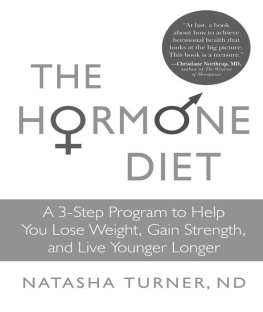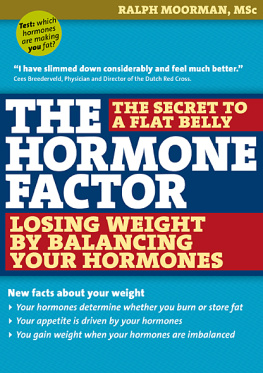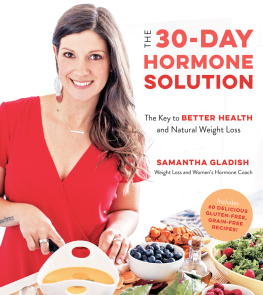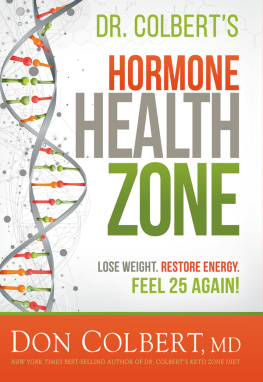
This book is intended as a reference volume only, not as a medical manual. The information given here is designed to help you make informed decisions about your health. It is not intended as a substitute for any treatment that may have been prescribed by your doctor. If you suspect that you have a medical problem, we urge you to seek competent medical help.
Mention of specific companies, organizations, or authorities in this book does not imply endorsement by the author or publisher, nor does mention of specific companies, organizations, or authorities imply that they endorse this book, its author, or the publisher.
Internet addresses and telephone numbers given in this book were accurate at the time it went to press.
This book is being published simultaneously in Canada by Random House Canada.
2016 by Essence Wellness Inc.
All rights reserved. No part of this publication may be reproduced or transmitted in any form or by any means, electronic or mechanical, including photocopying, recording, or any other information storage and retrieval system, without the written permission of the publisher.
Book design by Rachel Cooper
Library of Congress Cataloging-in-Publication Data is on file with the publisher.
ISBN-13 978-1-62336-677-3 hardcover
ISBN-13 978-1-62336-678-0 e-book

We inspire health, healing, happiness, and love in the world.
Starting with you.
RodaleWellness.com
For Timmy
You boost me big time, honey. Love you.
and
To my dearly missed and loved friend and colleague
Rishi Angras (19772015)

CONTENTS
Fat-Loss Hormone #1: Thyroid Hormone
Your Metabolic Master
Fat-Loss Hormone #3: The Androgenic Hormones
DHEA and Testosterone
Fat-Loss Hormone #4: Growth Hormone and Acetylcholine
Hormones of Strength and Rejuvenation
Brain Boost: Happy, Mentally Sharp and Craving-Free
Dopamine, Serotonin and Melatonin
FROM ME TO YOU: WHY I WROTE THIS BOOK
Its time to say goodbye, but I think goodbyes are sad and Id much rather say hello. Hello to a new adventure.
ERNIE HARWELL, sportscaster for 55 years, 42 of them with the Detroit Tigers
In my early twenties, just a few months after my graduation from university in 1993, I arrived home one day from my summer job in tears and feeling overwhelmed. I couldnt think. My head was buzzing with confusion. I felt weak and feverish. I couldnt understand people when they spoke to me. I couldnt seem to process information fast enough to make sense of anything. I thought I was going crazy and was certain I had a serious neurological disease.
I had a friend take me to the emergency room, where the doctors found I indeed had a fever, along with severe anemia. They told me to take some iron and to go home and rest, which was about all I was capable of. I would wake up feeling okay, but within minutes the confusion and fogginess in my head would return. Even in this state, I began to realize something had been off for months. I had needed so much sleepover 16 hours a dayand was too tired to go to the gym, even though I was an exercise fanatic. I was gaining weightalmost 25 pounds. My periods were irregular and I was losing fistfuls of hair. I had chalked it all up to the stress of finishing school and ending a relationship with my boyfriend at the time.
Luckily the emergency room doctor investigated further into why I was so anemic and tested my blood (TSH level) to rule out hypothyroidism. Days later, I received a call letting me know my TSH was over 25, when a normal level is considered to be less than 4.7 and an optimal level is less than 2. I was severely hypothyroid, with extremely low iron levels and a low red-blood-cell count. Confusion was overcoming me because my brain function was slowing down along with the rest of me. I started taking thyroid medication immediately. Within a week I felt like a completely different person, and I continue to take thyroid medication today.
Looking back, I know I had the telltale symptoms of hypothyroidism as early as age 13. I remember waking up with my pillow covered in my hair and being taken to dermatologists for hair loss, but nothing those doctors proposed ever helped. I remember feeling tired all the time and having horrible menstrual issues, including pain, cramping and irregular cycles. I always had belly fat and would never wear a two-piece bathing suit. Now I know my disease was missed because I seemed to be slim. Because my weight appeared normal, my doctors did not think of looking for hypothyroidism, a condition commonly found in noticeably overweight people.
Move on to 2000 and entering my thirties. After finishing four years of training, I began my practice as a naturopathic doctor. Yet somehow, and in direct contrast to my new wellness profession, I developed an addiction to cookies and muffins because I craved them so badly. And after the quest for these sugary treats, it was always followed by fighting to stay awake and a carb coma. At the same time, my periods were becoming more irregular, my breasts were shrinking, my waist was getting wider and I was losing hairagain.
On a professional hunch, I underwent a thorough investigation involving blood work and ultrasounds. My suspicions were confirmedI had polycystic ovarian syndrome (PCOS). PCOS is a condition characterized by irregular periods, hair loss, infertility, acne and weight gain; its also linked to infertility and an increased risk of breast cancer and diabetes. So I now had not one but two metabolic diseases. Since PCOS is associated with insulin resistance, the underlying cause of type 2 diabetes, insulin-sensitizing medications such as metformin are regularly prescribed to treat it. And I was definitely insulin resistant. Besides the high insulin levels detected by my blood work, my cravings, constant hunger, fatigue after eating and fat gain around my abdomen were obvious signs.
Fast forward to today and my forties. So far this decade is proving to be interesting and dynamic as the demands on me naturally continue to evolve, compounded with the responsibility of a new role within my family. Career pressures, a tax audit, overseeing my business, personal worries, plus the commitment (as well as the honor and pleasure) of managing my moms health-care needs, form past and present contributing factors to my stress and high cortisol levels. Thank goodness I possess the ability and know-how to effectively tackle the impact of these hormonal changes with diet, supplements and necessary adjustments to my thyroid prescription (I still continue to take thyroid medication that provides T4, but in the past few years I have required added compounded T3 to improve my thyroid profile).
As trying as they are, I am grateful for my experiences of hormonal concerns. Combined with years of clinical practice, they have allowed me to gain a much clearer view of the real big picture. Which brings me to a new topic of discussionmy friend in her forties, who I think of as the target audience for this book. Shes healthier, in some ways, than shes ever been: She stopped smoking four years ago, eats an almost vegetarian diet with lots of the right proteins and whole grains, watches her alcohol intake and tries to get some form of exercise every day (walking, strength training or yoga). But she feels like shes in a bit of a rut. Its not that theres any one thing wrong, she said in a recent conversation. Its more that I think things really could be better. You might be feeling this way toothinking about areas in your life that might be okay but could be better. We live in an all-or-nothing world. Everything is









